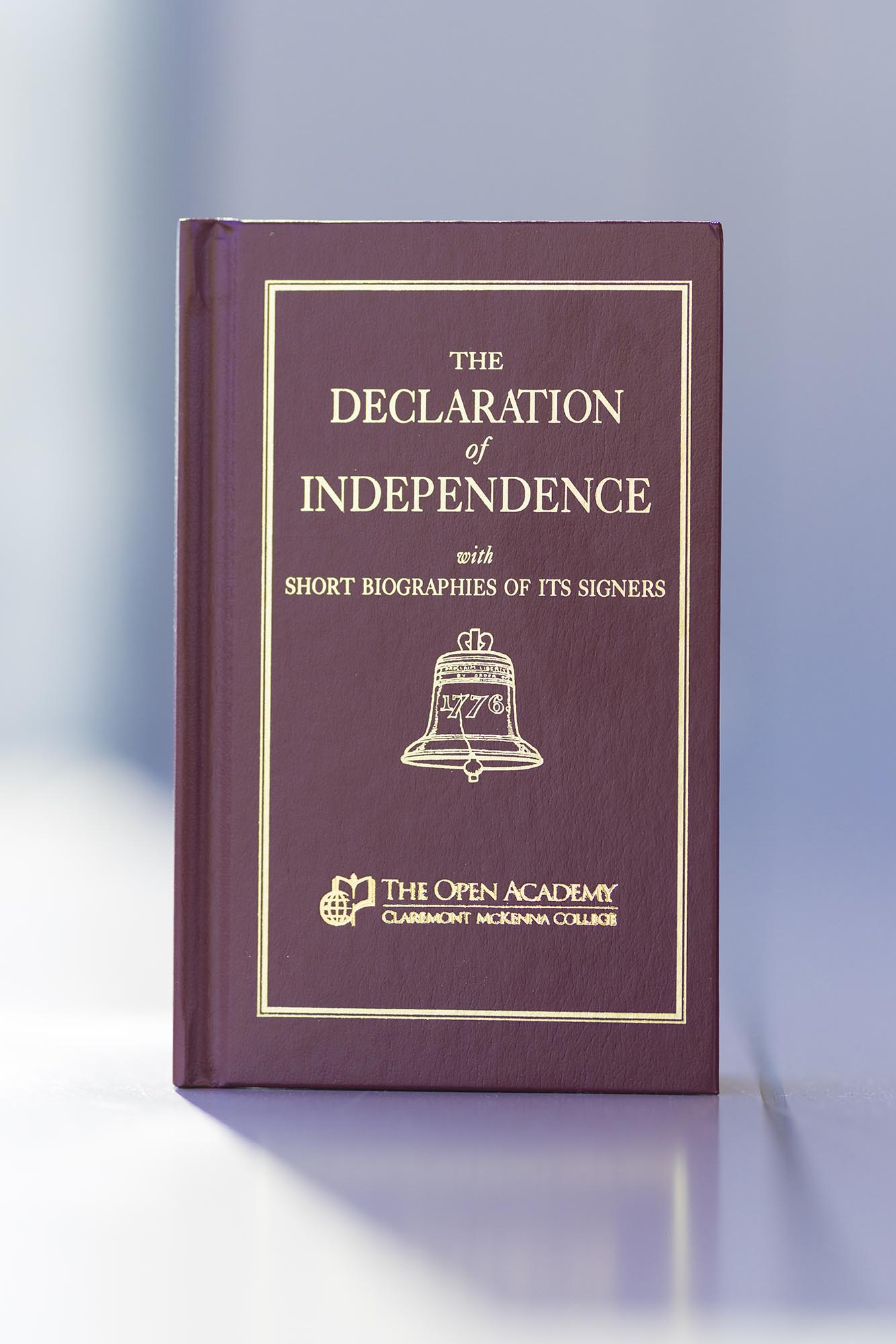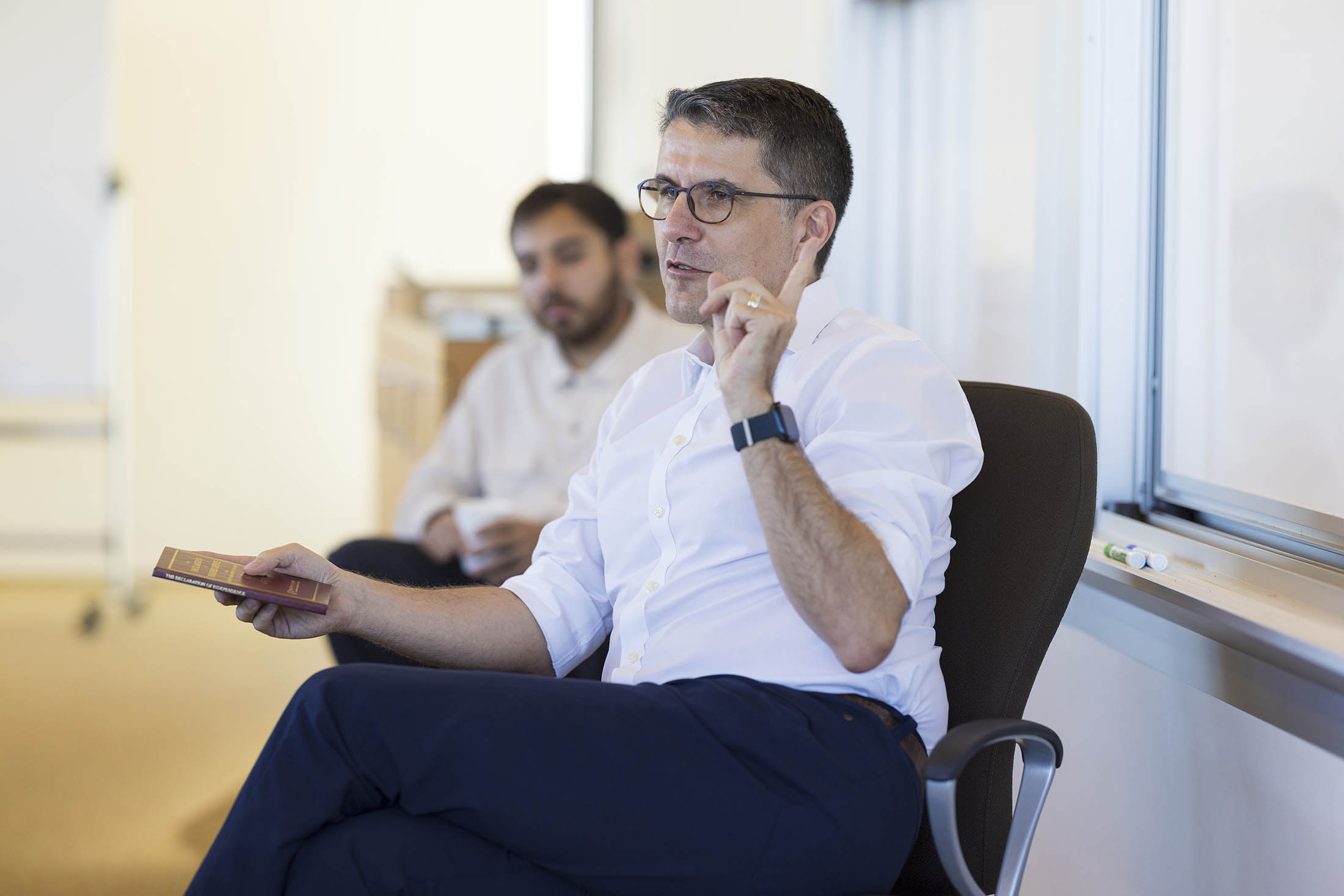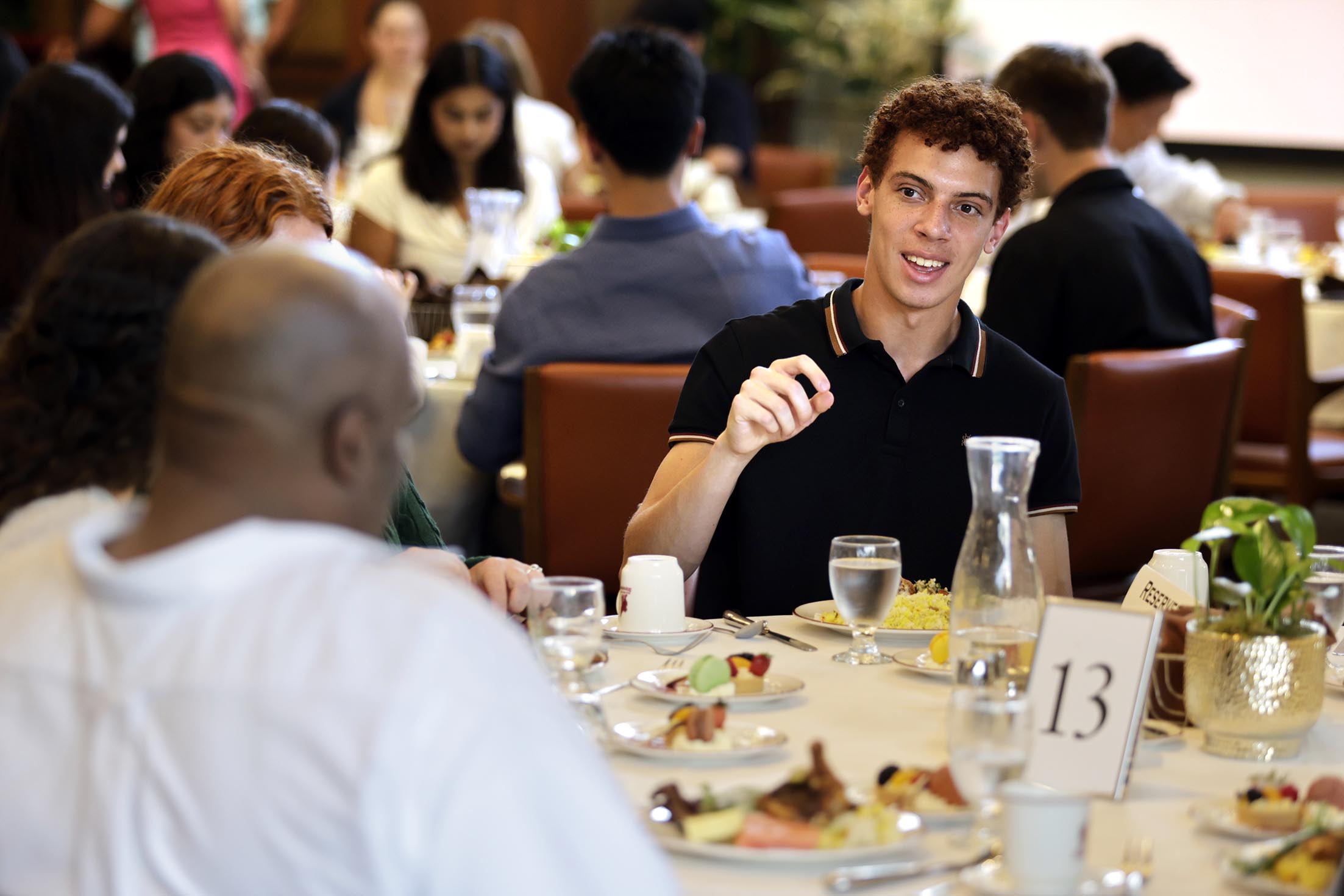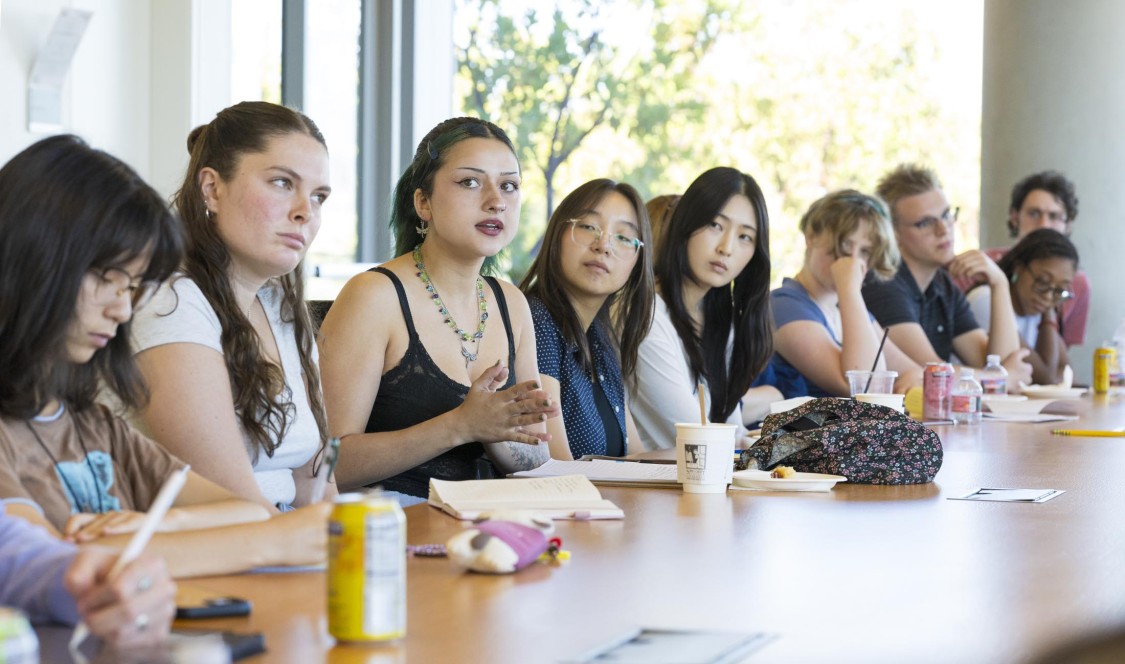This summer, students from CMC’s incoming Class of 2029 received a surprise gift in the mail: An Open Academy-branded version of the Declaration of Independence.
Now, “gift” might be too casual of a description. Given his recent appointment as director of The Open Academy, Professor Ioannis Evrigenis wanted to send something both thoughtful and purposeful for students new to the CMC experience. So, while not a homework assignment, per se, the Declaration of Independence will be a guiding source for Open Academy programming and constructive dialogue in the year ahead, Evrigenis emphasized.

“This year is the lead-up to the 250th Anniversary of our country’s founding. And that fits with not just the principles of The Open Academy, but a lot of what CMC stands for,” said Evrigenis, Alice Tweed Tuohy Professor of Government and Ethics. “The questions raised by the Declaration of Independence, whatever position one takes on them, provide for constant conversation. So, it felt like a good way to organize our thinking around the year and to provide incoming students with a common reference point that they could return to if they’ve gone to an Ath event, or a lecture, or a workshop, or even as they engage in conversations with their friends.”
The Open Academy and Salvatori Center were recently awarded grants by the Jack Miller Center for programming related to the 250th Anniversary in July 2026 and Constitution Day 2025 (September 17). In addition to a range of topical Open Academy salons, seminars, and reading groups throughout the academic year, Evrigenis is especially excited that CMC will host Declaration-themed talks by luminaries like Nadine Strossen, William Kristol, Danielle Allen (in February), Mark Lilla (in February), and David Armitage (in April), to name a few.
“We have a lot planned, and I think it’s going to broaden our understanding of the major issues that we all face together,” he said. “More than anything, I really want students to read, think about, and discuss the Declaration as a matter of civic duty—not only because it’s the framing document of the United States, but also because it’s been so influential around the world.”
Below, Evrigenis shared his additional hopes for The Open Academy in the year ahead:
Why was it important to build programming around a central theme in your first year with The Open Academy?
Part of what we see time and again in the various pathologies of public discourse is that people are often speaking at cross purposes. They’re speaking past each other. They’re not listening to each other. They don’t understand what the other person means. I strongly believe that a common language and an agreement on basic meanings or basic points of reference is necessary if a discussion is going to be grounded—and expect to go anywhere productive. I wanted to do that in this moment, and I intend to do that every year.

Specifically with the Declaration, I also want to treat the founding documents as living documents. Because that’s what they are. I want students to think of this exercise as part and parcel of what they’re doing, not just as CMC students, but for the rest of their lives. And I get that reasonable questions for my plan would be: So, why do you need to print the Declaration of Independence and send it? Why not just send a link for everyone to click on and open? I purposely wanted to send a hardback edition of the Declaration of Independence that students could hold in their hands, know where to find, and hopefully keep forever. I think it’s important to get back to the habit of recognizing that there are some books you should own. Some books you should keep going back to. That’s something the founders did and what any great thinker in any era has done as a matter of principle. This is how we remain in constant dialogue with our past, present, and future.
How do Open Academy principles extend to the liberal arts at CMC? Do you already have some reference points across disciplines in mind?
Absolutely. If you're a science major, for example, what does it mean that nature is invoked time and again in the Declaration? What does it mean that science funding is contingent on the government? So, there’s no one who is immune from this document. I also want to try and make it clear to people who may be thinking of certain issues only in boxes—you know, there’s the historical “stuff” and there’s the political “stuff”—and what does any of that have to do with fill-in-the-blank? I want to provide the connection so that people can start to think in cross-disciplinary ways, in creative ways. Because one of the big skills that the liberal arts are supposed to be providing is excellence in problem solving. And it's not problem solving in one specific discipline. Rather, can you think broadly and creatively and draw the connections between things that other people might not be seeing?
What do you value about CMC students that influences where you’d like to take The Open Academy?
Well, we don’t just talk the talk here. We don’t talk about Open Academy principles because they’ve all of a sudden become fashionable. We’ve been doing it for a long time, this is who we are, and we continue to be mindful of the connection between Open Academy principles and the basic principles behind a liberal arts education. So, that deliberate effort creates a real focus that has already laid a great foundation for the steps that I’ve mentioned.

Where CMC students are concerned, I’m always impressed by how they bring a great sense of curiosity to campus. There’s a culture of genuine interest in learning here—asking the questions that need to be asked, pursuing the answers wherever they lead. This makes for an optimal experience in the classroom. And just from what I’ve witnessed at Open Academy salons, at the Ath, or just in everyday campus dialogue, CMC students truly embrace intellectual humility. I especially see it advocated by the faculty, and that is really the essential starting point for a strong relationship with the complexity of the universe. Because when you get right down to it, we really don’t know very much—and it should be our goal to learn more.
Do you have any other big goals this year?
I want to be attentive to the spaces where this work is already happening and integrate The Open Academy more fully with the rest of campus. Our work is not for a specific political outlook. It’s not for a specific set of issues. So, I’m working with directors of the research institutes, for example, to jointly appoint students to roles—for instance, working with The Open Academy and at the Gould Center, or at the Salvatori Center, or as a CARE Fellow. That way we can do a lot more co-organizing and students can be empowered, at events for instance, to wear their Open Academy hat and their institute hat, to be constantly thinking about the crossover between interests and topics. We’re also going to be partnering very closely with the Dean of Students, in particular Vince Greer and his great work on constructive dialogue, as well as with the Kravis Lab for Civic Leadership, to encourage less formal conversations in the residence halls and across campus. Or to have pizza for a topical discussion. Or to be outside on an incredible Claremont night for a fireside chat. We’ve already collaborated on the First-Year Ath Dinners, and there’s a lot more potential to bring conversations naturally together in the way that makes CMC special.
This fall, the country was left reeling by political violence at an event on a college campus, the continuation of a disturbing trend where public figures are targeted for their beliefs. How has CMC discussed the nature of debate and disagreement in light of these volatile moments, and how can the College’s work chart a better course for students to understand this modern political climate?
CMC was as affected by the assassination of Charlie Kirk as the rest of the country. It was immediately clear that we needed to provide an opportunity to reflect on its significance and aftermath, so in less than 24 hours, and with exemplary coordination among staff, faculty, and students, The Open Academy put together a discussion at the Ath on September 12th. Despite the short notice, around 100 members of our community—mostly students—came together to share their thoughts. I was very impressed by the insightful observations and reflections of the many students who shared their thoughts with the entire group, as well as by the smaller discussions that followed. Several students reported that the discussion provided a sense of perspective and a corrective to the bile that characterized so much of what was posted on social media and public discourse. It was powerful evidence of the fact that our Open Academy principles are not mere slogans at CMC. We have already held and are planning to hold more events on the current political climate and polarization.
Editor's note: The final question was added to extend the Q&A following events during the semester.

